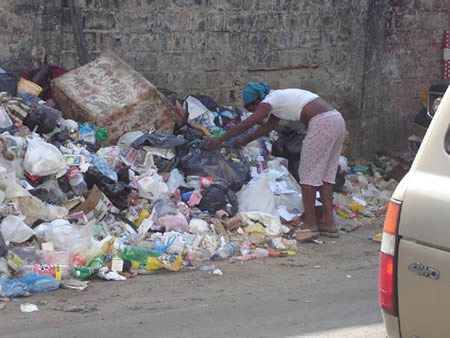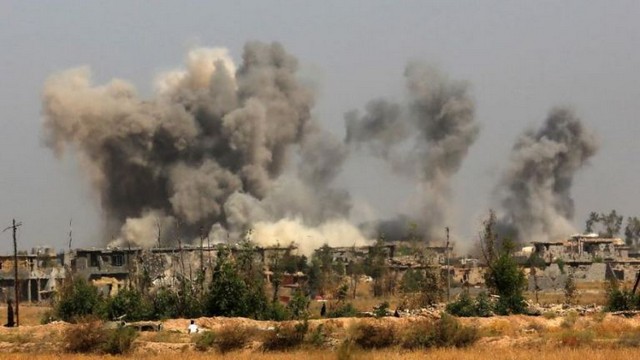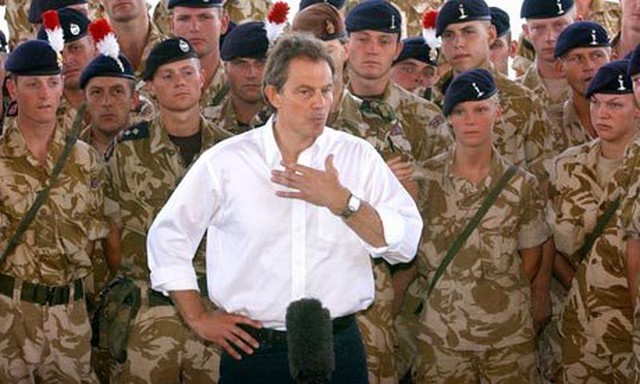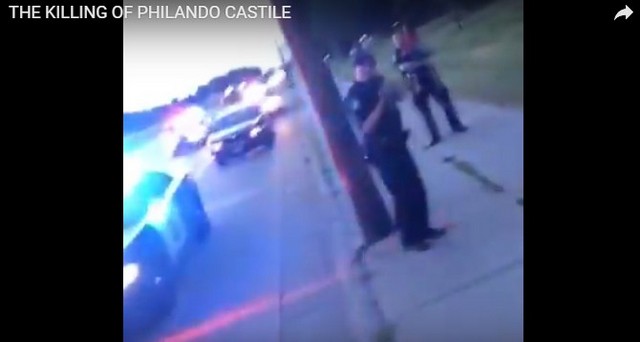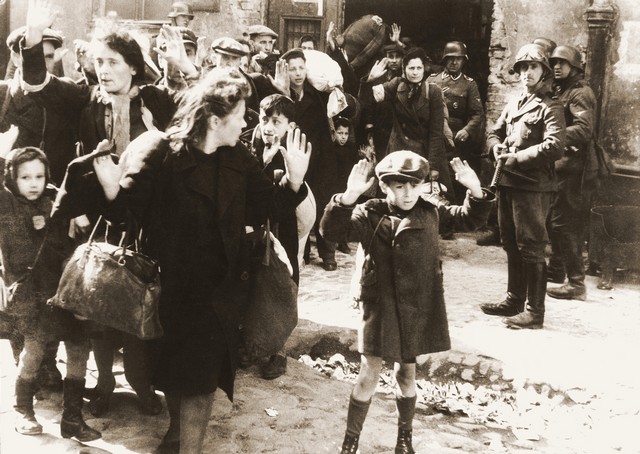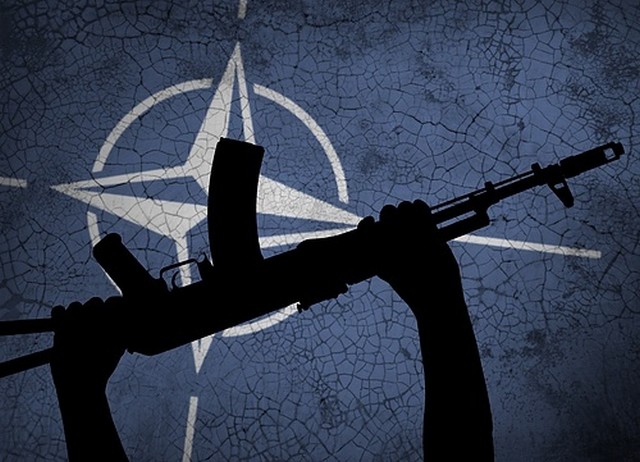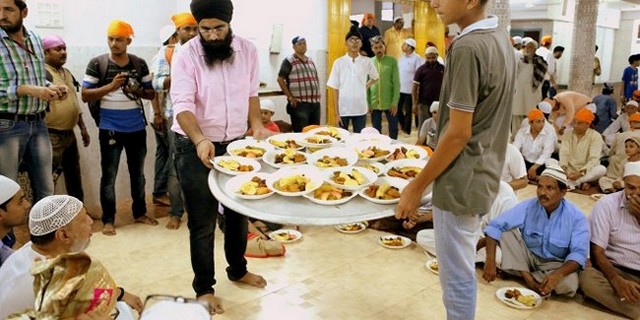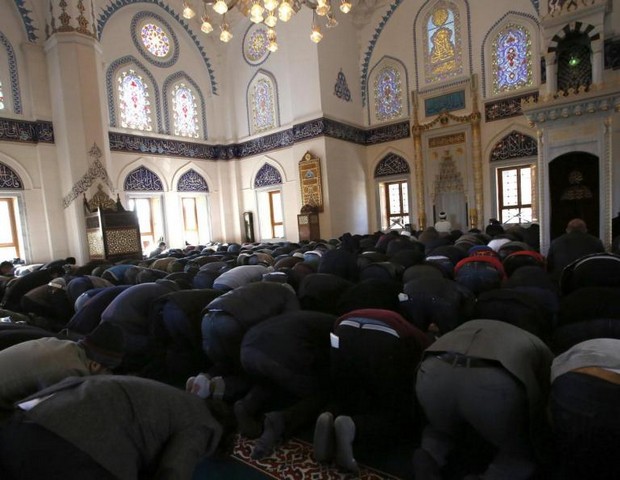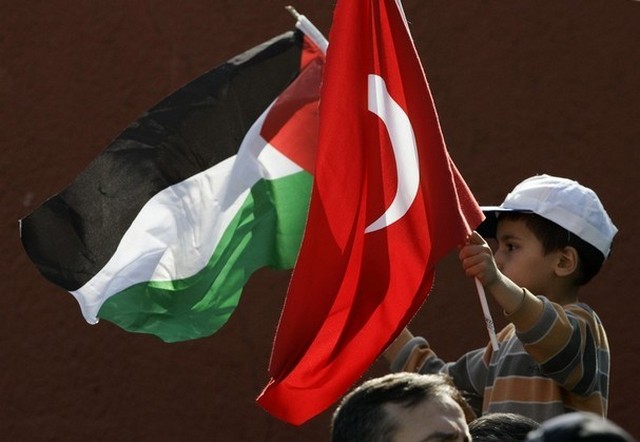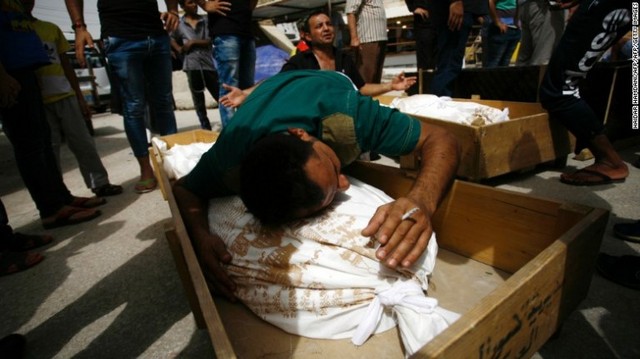By Dr Gideon Polya
In another example of outrageous British Establishment mendacity, the inexpert, Zionist-subverted, UK Iraq Inquiry, aka the Chilcot Inquiry, criticized intelligence failures re non-existent Iraqi WMD but whitewashed the US-, UK- and Australia-complicit, 1990-2011 Iraqi Genocide and Iraqi Holocaust in which 4.6 million Iraqis died from violence (1.7 million) or from violently-imposed deprivation (2.9 million) by (a) suggesting that about 150,000 Iraqis may have died due to the 2003-2011 invasion and occupation, (b) ignoring Coalition war crimes including the illegality of the invasion per se, (c) ignoring the real reasons for the invasion (oil, US hegemony and Apartheid Israel) , and (d) implicitly approving such war criminal invasions if done better.
The 12 volume Chilcot Report is 2.6 million words long and has a 145-page executive summary [1-3]. The chairman of the Iraq Inquiry, Sir John Chilcot, launched the Chilcot Report with a 12-page summary statement on 6 July 2016 that included the following extraordinary example of British Establishment mendacity and understatement “More than 200 British citizens dies as a result of the conflict in Iraq. Many more were injured. This has meant deep anguish for many families, including those who are here today. The invasion and subsequent instability in Iraq had, by July 2009, also resulted in the deaths of at least one hundred and fifty thousand Iraqis – and probably any more – most of them civilians. More than a million people were displaced. The people of Iraq have suffered greatly ([3], page 9).
By way of comparison , it would be useful to read the following 485-word summary from the carefully researched and science-based website “Iraqi Holocaust Iraqi Genocide” [4]:
“The US Alliance-imposed Iraqi Holocaust and Iraqi Genocide … as of December 2011 was associated with post-1990 and post-2003 violent deaths and non-violent avoidable deaths from war-imposed deprivation totalling 4.6 million and 2.7 million, respectively, and refugees totalling 5-6 million – an Iraqi Holocaust (noting that a holocaust involves the deaths of a huge number of people) and an Iraqi Genocide as defined by Article 2 of the UN Geneva Convention [5] which states: “In the present Convention, genocide means any of the following acts committed with intent to destroy, in whole or in part, a national, ethnic, racial or religious group, as such: a) Killing members of the group; b) Causing serious bodily or mental harm to members of the group; c) Deliberately inflicting on the group conditions of life calculated to bring about its physical destruction in whole or in part; d) Imposing measures intended to prevent births within the group; e) Forcibly transferring children of the group to another group.” The UK, the US and their allies have been variously killing Iraqis since 1914 – there have been 9 million Iraqi deaths from Western violence or Western-imposed deprivation since 1914…
ignoring Iraqi deaths associated with the US-backed Iraq-Iran War, but including 4.6 million Iraqi deaths from Western violence or imposed deprivation in the period 1990-2011, one can estimate about 9 million Iraqi deaths from UK or US violence or imposed deprivation in the century after the 1914 invasion of Iraq by Britain – an Iraqi Holocaust and an Iraqi Genocide…
According to the 2006 Revision UN Population Division data, medical literature data, and other authoritative sources, the Iraqi Holocaust in the Occupation period of 2003-2011 has been associated with 1.2 million post-invasion non-violent avoidable deaths from war-imposed deprivation; 1.5 million violent post-invasion deaths (see the eminent US Just Foreign Policy [6]) ; and 0.8 million post-invasion under-5 infant deaths (90% avoidable and due to gross US Coalition violation of the Articles 55 and 56 of the Geneva Convention Relative to the Protection of Civilian Persons in Time of War which demand that an Occupier supplies food and medical requisites to “the fullest extent of the means available to it” [7]. In addition, avoidable deaths from imposed deprivation under Sanctions (1990-2003) totalled 1.7 million, violent deaths in the Gulf War totalled 0.2 million and under-5 infant deaths under Sanctions totalled 1.2 million (90% avoidable and due to US Alliance war crimes). Iraqi refugees (both inside and outside Iraq) total 5-6 million.
The Iraqi Holocaust and Iraqi Genocide (1990-2011) involves in total 1.7 million violent deaths, 2.9 million non-violent excess deaths, 4.6 million violent and non-violent excess deaths, 2.0 million under-5 infant deaths, 1.8 million avoidable under-5 year old infant deaths and 5-6 million refugees – an Iraqi Genocide according to the UN Genocide Convention definition of “acts committed with intent to destroy, in whole or in part, a national, ethnic, racial or religious group” [4].
The gross under-estimate by Sir John Chilcot and by the 2009-2016 Chilcot Inquiry of Iraqi deaths under Coalition Occupation (circa 150,000 as compared to a science-based estimate of 2.7 million) is explained when one turns to Section 17 of the Chilcot Report [2]. The 150,000 estimate derives from Iraqi Body Count which relied on media and government reports – an approach criticized as severely flawed by the top medical epidemiologist authors of successive papers in the top medical journal The Lancet whose expert polling results underpin the estimate of 1.5 million violent Iraqi deaths in the post-invasion period by the US Just Foreign Policy organization and are in agreement with results from independent polling by the UK polling agency Opinion Research Business (ORB). In short, the Chilcot Committee chose to accept a highly flawed estimate from non-experts, totally ignored the ORB estimates and those of the eminent US Just Foreign Policy, and chose to accept ignorant criticism of the work of top US medical epidemiologists.
The Chilcot Report further compounded its holocaust-ignoring by ignoring non-violent Iraqi deaths from violently-imposed deprivation totalling 1.5 million under Sanctions (1990-2003) and 1.2 million under Occupation (2003-2011), as estimated from UN Population Division demographic data by the straightforward methodology described in my book “Body Count. Global avoidable mortality since 1950” [8]. The horrible reality is that, as recognized by Sir John Chilcot, most of the victims of violent death in the high technology Iraq War wars are civilians ([3], page 9). However avoidable deaths from war-imposed deprivation are greatly in excess of violent deaths. Thus Muslim avoidable deaths from deprivation in 20 countries subject to Western military intervention in the US War on Terror (aka the US War on Muslims) since the US Government’s 9-11 false flag atrocity (3,000 killed) total about 27 million as compared to violent deaths totalling about 5 million. These horrendous estimates demand peace now and ICC prosecutions of those responsible for the ongoing Iraqi Holocaust and Iraqi Genocide and the ongoing Muslim Holocaust and Muslim Genocide of which it is a part [9, 10].
The Chilcot Report also ignored the estimate from 2006 UN Population Division data of 0.8 million under-5 year old Iraqi infants dying under Coalition Occupation, evidence of an immense US Coalition war crime in gross violation of the Articles 55 and 56 of the Geneva Convention Relative to the Protection of Civilian Persons in Time of War which demand that an Occupier supplies food and medical requisites to “the fullest extent of the means available to it” [7]. All Sir John Chilcot can offer by way of mitigation of the post-invasion disaster in Iraq is as follows: “After the invasion, the UK and the US became joint Occupying Powers… The Government’s preparations failed to take account of the magnitude of the task of stabilising, administering and reconstructing Iraq, of the responsibilities which were likely to fall to the UK” ([3], page 9).
Much of the Chilcot Report was concerned with intelligence about Weapons of Mass Destruction (WMD) that was used as a case for war. Sir John Chilcot concludes: “The judgements about the severity of the threat posed by Iraqi’s weapons of mass destruction – WMD- were presented with a certainty that was not justified” ([3], page 2) – disingenuous casuistry and weasel words because as we all knew for certain by March 2003 and as many experts had hypothesized before the invasion in the absence of any conclusive evidence – that there were zero (0) WMD in Iraq. After 7 years of “research” and 2.6 million words, the Chilcot Report declined to conclude on whether the demonstrably illegal invasion of Iraq was in fact illegal as summarized by more weasel words from Sir John Chilcot : “ In the absence of a majority in support of military action, we consider that the UK was in fact undermining the Security Council’s authority. Second, the Inquiry has not expressed a view on whether military action was legal,. That could, of course, only be resolved by a properly constituted and internationally recognised Court. We have, however, concluded that the circumstances in which it was decided that there was a legal basis for UK military action were far from satisfactory” ([3], page 4).
However International Law is quite clear about the legality of invading another country. Such invasion can only occur (1) with UN Security Council (UNSC) sanction, (2) if the country to be invaded has attacked or acutely threatens to attack, or (3) if the government of that country invites invasion – and then only after extensive discussion. The British imperialist Chilcot Inquiry at least concedes the last point, as stated by Sir John Chilcot: “We have concluded that the UK chose to join the invasion of Iraq before the peaceful options for disarmament had been exhausted. Military action at that time was not a last resort” ([3], page 1). Sir John Chilcot further commented on the altered, pro-war advice of Jewish British Attorney General Peter Goldsmith (appointed in 2008 as an independent non-executive director of the Australian property trust, Westfield Group, co-founded by Israeli-Australian Zionist Frank Lowy): “In mid-January 2003, Lord [Peter] Goldsmith told Mr Blair that a further Security Council resolution would be necessary to provide a legal basis for military action. He did not advise No. 10 until the end of February that, while a second resolution would be preferable, a “reasonable case” could be made that resolution 1441 was sufficient. He set out that view in written advice on 7 March. The military and the civil service both asked for more clarity on whether force would be legal. Lord Goldsmith then advised that the “better view” was that there was, on balance, a secure legal basis for military action without a further Security Council resolution. On March , he asked Mr Blair to confirm that Iraq had committed further material breaches as specified in resolution 1441. Mr Blair did so the next day. However, the precise basis on which Mr Blair made that decision is not clear”([3], pages 4 and 5).
History is written by the victor.
The 5 British Establishment members of the Chilcot Inquiry included Sir John Chilcot ( English and languages graduate of Cambridge, and subsequent career civil servant), Sir Lawrence Freedman (Oxford PhD, Blair foreign policy adviser, “dean of British strategic studies”, and a Jewish Zionist military historian), Sir Roderic Lyne (Etonian, history graduate of Leeds University after special entry due to poor A levels, and a career diplomat), Sir Martin Gilbert (history graduate of Oxford, Oxford PhD, pro-Iraq War, and Jewish Zionist historian of Churchill, WW1, WW2 and Apartheid Israel), and Baroness Usha Kumari Prashar (Kenya-born graduate in politics at Leeds University, PhD in social administration from Glasgow University, and director or chairman of a variety of public and private sector organisations). No scientists, no lawyers, and no international law experts were members of the Chilcot Inquiry but just the mandatory graduates from 92-Nobel-Laureate Cambridge University or 64-Nobel-Laureate Oxford University plus 2 people from the lesser 6-Nobel-Laureate Leeds University.
The Chilcot Inquiry had a Jewish Zionist bias, with 2 out of the 5 members being Jewish Zionists and the remainder being pro-Zionists as evidenced by the lack of any mention of Apartheid Israel in the Sir John Chilcot Statement [3]. Despite the reality that Jews represent 0.5% of the British population, and that possibly half of them are not Zionists, it is apparent that there is overwhelming pro-Zionist position in the British political Establishment, whether Tory, Liberal Democrat or Labour, and this is reflected in 2 out of the 5 members of the Chilcot Inquiry being Jewish Zionists – an extraordinary conflict of interest since Apartheid Israel was actively involved in bombing Iraq in the 20th and 21st centuries and the ugly reality that the Iraq War was basically about oil, US hegemony and enhancing Apartheid Israeli security by destroying Iraq.
Jewish Zionist Chilcot Inquiry member Sir Martin Gilbert (1936-2015) was an eminent UK historian in the areas of Jewish history, Zionism, Churchill, WW1, WW2 and 20th century history. He was one of very few UK historians who actually mentioned the 1942-1945 Bengali Holocaust (6-7 million Indians deliberately starved to death by Churchill for strategic reasons) but must be criticized for hugely under-estimating this atrocity, excusing the British, eliminating any mention of this from his histories of Churchill, ignoring other holocausts, and grossly exaggerating deaths in the WW2 Jewish Holocaust. To assess the reliability of Sir Martin Gilbert’s advice to the Chilcot Inquiry, one can turn to in his book “A History of the Twentieth Century. Volume Two 1933-1951” [11] that is remarkable and praiseworthy in British historiography for actually mentioning the Bengal Famine, but which stated [my corrections in square brackets]: “In the summer of 1943, as supplies of rice ran out [incorrect, it began in 1942 and rice price rather than rice stores was crucial], famine spread through Bengal. Its ravages were savage and swift. The poor, and villagers in the remoter regions were its main victims [people starved in Calcutta], not only in Bengal, but in neighboring Orissa and distant Malabar [also in Bihar and Assam]. Within a few months, as many as 1,500,000 Indians had died [6-7 million died, 1942-1945]. The Bengal Famine was one of the worst famines of the century (p522)…Between 1939 and 1945 disease and hunger had taken their toll, with war conditions making it much harder to organize alleviation. In Bengal, a million and half Indians died of starvation [6-7 million died in Bengal, Assam and Orissa] (p725)” [12]. Of course Zionist Martin Gilbert is not alone in his ignoring in his Churchill biographies of the WW2 Bengali Holocaust for which racist, imperialist, warmonger and mass murderer pro-Zionist Winston Churchill was responsible. In my book “Jane Austen and the Black Hole of British History” [13] I catalogue numerous histories that totally ignore the WW2 Bengali Holocaust that has been assiduously kept from public perception in the English-speaking world by several generations of lying and racist historians.
In a detailed article about the late Sir Martin Gilbert (1936-2015) on the occasion of his death, I wrote: “History ignored yields history repeated and racist Mainstream holocaust ignoring, holocaust minimizing and genocide ignoring by the likes of Zionist historian Sir Martin Gilbert has allowed atrocities such as Palestinian Genocide in which 90% of Palestine has been ethnically cleansed by the Zionist invaders; 2 million Palestinian have been killed through violence (0.1 million) or violently-imposed deprivation (1.9 million) since 1936 (i.e. in Martin Gilbert’s own lifetime); and of 12 million Palestinians (half of them children) 6 million are prevented from even stepping foot in their own country, 4.3 million are highly abusively confined without human rights to West Bank mini-Bantustan ghettoes (2.5 million) or the Gaza Concentration Camp (1.8 million) , and only 1.7 million (14%) as Israeli Palestinians are able to vote for the government ruling all of Palestine, albeit as Third Class citizens under Nazi-style Apartheid laws. It gets worse. Neocon American and Zionist Imperialist (NAZI)-perverted Mainstream journalists, editors, politicians and academics continue to ignore the horrendous realities of the ongoing Iraqi Genocide and Afghan Genocide (deaths from violence or war-imposed deprivation 4.6 million and 5.5 million, respectively), the ongoing Muslim Holocaust and Muslim Genocide (12 million Muslim deaths from deaths from violence or war-imposed deprivation in the Zionist-backed post-1990 US War on Muslims), the ongoing Global Avoidable Mortality Holocaust (17 million avoidable deaths annually on Spaceship Earth with the First World in charge of the flight deck), and a worsening Climate Genocide (5 million people already die each year from climate change , 0.5 million, or carbon burning , 4.5 million, but 10 billion people are set to perish this century if man-made climate change is not requisitely addressed) [13, 14]. The late Martin Gilbert was a member of the UK Chilcot Inquiry into the Iraq War that has yet to hand down its report – Professor Sir Martin Gilbert may yet keep lying from the grave”. My prediction has been borne out by the lying by omission of the mendacious Chilcot Report” [12].
Sir Martin Gilbert’s apologia for Churchill over the 1942-1945 Bengali Holocaust in which the British allowed 6-7 million Indians to perish: “War conditions making it much harder to organize alleviation” compares with the excusatory statement of Sir John Chilcot in relation to the Iraqi catastrophe : “After the invasion, the UK and the US became joint Occupying Powers… The Government’s preparations failed to take account of the magnitude of the task of stabilising, administering and reconstructing Iraq, of the responsibilities which were likely to fall to the UK” – in the 2003-2011 Occupation, 1.5 million Iraqis were killed, a further 1.2 million died from war-imposed deprivation, and there were 0.8 million post-invasion under-5 Iraqi infant deaths, 90% avoidable and due to gross US Coalition violation of the Articles 55 and 56 of the Geneva Convention Relative to the Protection of Civilian Persons in Time of War which demand that an Occupier must supply the Conquered Subjects with life-sustaining food and medical requisites to “the fullest extent of the means available to it” [7]. Just as holocaust denial by Sir Martin Gilbert reduced the Bengali Holocaust death toll from 6-7 million to 0.7 million, so holocaust denial by the Zionist-subverted Chilcot Inquiry reduced the Iraqi death toll from 2.7 million to 0.15 million [3].
The appalling legacy of a quarter of a century of Western violence against Iraq (1990-2015) – for oil, US hegemony and Apartheid Israeli hegemony – is summarized below, with much of the data being found in “Iraqi Holocaust Iraqi Genocide” [1], in “Genocide in Iraq” volumes I and II by Iraqi scholars Dr Abdul-Haq Al-Ani & Tariq Al-Ani, and in reviews of these works [15-19], noting that about half of the Iraqi population of 30 million are children :
(1). 1.7 million Iraqi violent deaths.
(2). 2.9 million Iraqi avoidable deaths from violently -imposed deprivation.
(3). 2 million under-5 year old Iraqi infant deaths, 90% avoidable and due to gross violation of the Geneva Convention by the US Alliance.
(4). 7,700,000 Iraqi refugees.
(5). 5,000,000 Iraqi orphans.
(6). 3,000,000 Iraqi widows.
(7). 1,000,0000 Iraqis missing.
(8). 4,000 Iraqi women (20% under 18) missing and presumed “trafficked”.
(9). 3.5 million Iraqi children living in dire poverty.
(10). 1.5 million Iraqi children are undernourished.
(11). Iraqi cancer cases in cases per 100,000 people were 40 (1990), 800 (1995) and 1,600 (2005).
(12). 40% of Iraqi professionals have left since 2003.
(13). 34,000 doctors (1990) declined to 16,000 doctors (2008).
(14). More than 2,200 doctors and nurses killed.
(15). The Iraqi health budget dropped from $450 million pa (1980-1991) to $22 million (2002),
(16). Most of Iraqi children are traumatized by war.
(17). From high literacy pre-1990 to 74% illiteracy in 2011.
Iraq has been substantially destroyed as a modern state by US state terrorism, with the participation of its state terrorist allies including Britain, France, Australia and Apartheid Israel among others. The same state terrorists have been variously involved in the similar destruction of Somalia, Libya, Yemen, Palestine, Afghanistan and Syria. These are unforgivable crimes and the US Alliance war criminals must be brought to account by the world through international law and through application of Boycotts, Divestment and Sanctions (BDS) against all people, politicians, parties, corporations and countries disproportionately responsible for the Iraqi Holocaust and Iraqi Genocide.
Concluding comments.
Sir John Chilcot’s statement on the Chilcot Inquiry commenced with a highly deceptive assertion about the illegal invasion of Iraq and British innocence: “ In 2003, for the for time since the Second World War, the United Kingdom took part in an invasion and full-scale occupation of a sovereign state” ([3], page 1). In reality since the Second World War, the UK occupied a swathe of countries across the globe and 1950-2005 avoidable deaths from deprivation in countries occupied fully or partly by the UK in the post-1945 era totalled 727 million [8]. Further, post-1945 the UK invaded a number of countries with dire consequences, namely Korea (1950-1953; 28% of the North Korean population was killed by US bombing), Egypt (in 1956 in collusion with France and Apartheid Israel), and Afghanistan (in 2001 in collusion with the US Alliance, with 5.5 million deaths from violence (1.3 million) or from war-imposed deprivation (4.2 million)). In the period of Sanctions (1990-2003) Iraq deaths totalled 1.9 million, this including 0.2 million Iraqi deaths in the Gulf War and 1.7 million avoidable deaths from war-imposed deprivation [4]. Since the war criminal invasion of Iraq, the UK has participated in the invasion of Syria (2011; 0.1 million killed, 1 million refugees, and the formerly richest country in Africa destroyed and left riven with sectarian civil war) , resumed bombing Iraq (2014; this representing Britain’s 7th Iraq War in a century ), and commenced bombing Syria (2015; 0.5 million dead and 12 million refugees in the Western-backed civil war ) [4, 8, 20]. Contrary to the thesis of the Chilcot Report, the UK is not a noble country reluctantly forced to invade countries like Iraq for “world peace”, “security” and “freedom” . The British have invaded 193 countries in the last 1,000 years, as compared to the UK- and US-lackey Australians 85, France 80, the US 70 (50 after WW2 coupled with ongoing subversion of all nations), Germany 39, Japan 30, Russia 25, Canada 25, Apartheid Israel 12 and China 2 [21-25]. The state terrorist English Establishment has been a serial invader for 1,000 years and in the 21st century is second only to the US for genocidal state terrorism [21].
Sir John Chilcot’s statement on the Chilcot Inquiry concluded with lavish praise from the Iraq War Inquiry for its late member Professor Sir Martin Gilbert: “I also want to pay tribute to Sir Martin Gilbert , who died last year. As one of the pre-eminent historians of the past century, he brought a unique perspective to our world until he became ill in April 2012. We have missed him greatly as a colleague and friend” ([3], page 12). In horrible reality, mendacious British Zionist historian Martin Gilbert brought the obscene and deadly baggage of racism, falsehood, pro-Zionism, pro-Anglo-American imperialism, genocide ignoring, holocaust ignoring, genocide denying and holocaust denying to historiography, to public life and to the Chilcot Inquiry in particular.
In between these egregiously false slies (spin-based falsehoods), the Sir John Chilcot Statement summarizes a 2.6 million word Chilcot Report that has predictably whitewashed the US-, UK- and Australia-complicit, 2003-2011 Iraq War in which 2.7 million Iraqis died from violence (1.5 million) or from violently-imposed deprivation (1.2 million) by (a) suggesting that about 150,000 Iraqis may have died due to the 2003-2011 invasion and occupation, (b) ignoring Coalition war crimes including the illegality of the invasion per se, (c) ignoring the real reasons for the invasion (oil, US hegemony and Apartheid Israel) , and (d) implicitly approving such war criminal invasion if there were better pro-war intelligence and peaceful dialogue was exhausted.
Of course a glaring question left unanswered by the 2.6 million word Chilcot Report that took 7 years to research and write is simply this: why did Britain in particular have to invade Iraq? One can well ask: why not Switzerland, Sweden, Cuba, China etc? The Elephant in the Room answer from humane truth-tellers from the Right and the Left is that the Iraq War was about oil, with the corollaries of US hegemony and Apartheid Israeli hegemony. Thus, for example, on the Right, Alan Greenspan (who served as chairman of the US Federal Reserve for almost two decades) (2015): ‘I am saddened that it is politically inconvenient to acknowledge what everyone knows: the Iraq war is largely about oil” [4]. On the Left, Professor Noam Chomsky (famed linguistics professor and anti-racist Jewish American human rights and anti-war activist of 85-Nobel-Laureate Massachusetts Institute of Technology) (2009): “There is basically no significant change in the fundamental traditional conception that if we can control Middle East energy resources, then we can control the world” [4].
The Neocon American and Zionist Imperialist (NAZI)-perverted Mainstream media, politician and academic presstitutes have criticized the 2.6 million word Chilcot Report for not actually pronouncing on the illegality of the invasion of Iraq, but have praised the Chilcot Report for stating the obvious that the invasion of Iraq was based on untrue intelligence – the absence of Iraqi WMD was apparent to UN inspectors before the invasion and was apparent to everyone by March 2003.
Anti-racist Jewish British writer Harold Pinter declared in his 2005 Nobel Prize acceptance speech: “We have brought torture, cluster bombs, depleted uranium, innumerable acts of random murder, misery, degradation and death to the Iraqi people and call it ‘bringing freedom and democracy to the Middle East’. How many people do you have to kill before you qualify to be described as a mass murderer and a war criminal? One hundred thousand? More than enough, I would have thought. Therefore it is just that Bush and Blair be arraigned before the International Criminal Court of Justice” [26]. With 1990-2011 Iraqi deaths from US Alliance violence (1.7 million) or violently-imposed deprivation (2.9 million) totalling 4.6 million, one can in 2015 paraphrase this great humanitarian thus: “How many people do you have to kill before you qualify to be described as a mass murderer and a war criminal? 4.6 million? More than enough, I would have thought. Therefore it is just that George Bush (America), Tony Blair (Britain), John Howard (Australia) and all their accomplices be arraigned before the International Criminal Court”.
However arraignment of Bush, Blair and Howard before the ICC is not enough. The 2003-2011 Iraq War – Britain’s 6th Iraq War out of its 7 Iraqi Wars in a century – was the child of the Neocon American and Zionist Imperialist (NAZI)-perverted US political Establishment and backed by the similarly Zionist-perverted British political Establishment. Zionism is genocidal racism and the racist Zionists and their supporters should be sidelined from public life as have been like racists such as the Nazis, neo-Nazis, Apartheiders and the Ku Klux Klan (KKK). The key messages of the mendacious, genocide-ignoring and holocaust-ignoring Chilcot Report are that decent people around the word must (a) inform everyone they can about these awful realities , and (b) urge and apply Boycotts, Divestment and Sanctions (BDS) against all people, politicians, parties, corporations and countries disproportionately responsible for the Iraqi Holocaust and Iraqi Genocide.
References.
[1]. “The Iraq Inquiry Homepage”: http://www.iraqinquiry.org.uk/ .
[2]. The Iraq Inquiry. The Report: http://www.iraqinquiry.org.uk/the-report/ .
[3]. The Iraq Inquiry. Statement by Sir John Chilcot: 6 July 2016: http://www.iraqinquiry.org.uk/media/247010/2016-09-06-sir-john-chilcots-public-statement.pdf .
[4]. “Iraqi Holocaust Iraqi Genocide”: https://sites.google.com/site/iraqiholocaustiraqigenocide/home?pli=1 .
[5]. Article 2 of the UN Geneva Convention: http://www.edwebproject.org/sideshow/genocide/convention.html .
[6]. Just Foreign Policy, “Iraq Deaths”: http://www.justforeignpolicy.org/iraq .
[7]. Articles 55 and 56 of the Geneva Convention Relative to the Protection of Civilian Persons in Time of War: https://www.icrc.org/ihl.nsf/385ec082b509e76c41256739003e636d/6756482d86146898c125641e004aa3c5 .
[8]. Gideon Polya, “Body Count. Global avoidable mortality since 1950”, that includes an avoidable mortality-related history of every country since Neolithic times and is now available for free perusal on he web: http://globalbodycount.blogspot.com.au/2012/01/body-count-global-avoidable-mortality_05.html .
[9]. “Experts: US did 9-11”: https://sites.google.com/site/expertsusdid911/ .
[10]. Gideon Polya, “Paris Atrocity Context: 27 Million Muslim Avoidable Deaths From Imposed Deprivation In 20 Countries Violated By US Alliance Since 9-11”, Countercurrents, 22 November, 2015: http://www.countercurrents.org/polya221115.htm
[11]. Martin Gilbert, “A History of the Twentieth Century. Volume Two 1933-1951” (William Morrow, New York , 1998).
[12]. Gideon Polya , “UK Zionist Historian Sir Martin Gilbert (1936-2015) Variously Ignored Or Minimized WW2 Bengali Holocaust”, Countercurrents, 19 February, 2015: http://www.countercurrents.org/polya190215.htm .
[13]. Gideon Polya, “Jane Austen and the Black Hole of British History. Colonial rapacity, holocaust denial and the crisis in biological sustainability”, now available for free perusal on the web: http://janeaustenand.blogspot.com/2008/09/jane-austen-and-black-hole-of-british.html .
[14]. “Climate Genocide”: https://sites.google.com/site/climategenocide/ .
[15]. “Genocide in Iraq Volume I . The case against the UN Security Council and member states” by Dr Abdul-Haq Al-Ani and Tarik Al-Ani (foreword by Professor Joshua Castellino; Clarity Press, Atlanta).
[16]. Gideon Polya ““Genocide in Iraq, The Case Against UN Security Council And Member States”. Book review”, Countercurrents, 8 February, 2013: http://www.countercurrents.org/polya080213.htm .
[17]. Abdul-Haq Al-Ani and Tariq Al-Ani, “Genocide in Iraq Volume II. The Obliteration of a Modern State” (Clarity Press, 2015).
[18]. Gideon Polya, “Review: “Genocide in Iraq Volume II. The obliteration of a modern state” By Abdul-Haq Al-Ani & Tariq Al-Ani”, Countercurrents, 15 March 2015: http://www.countercurrents.org/polya150315.htm .
[19]. Gideon Polya, “12th anniversary of the illegal invasion of Iraq: the Anglo-American Iraqi Genocide”, Global research, 27 March 2015: http://www.globalresearch.ca/12th-anniversary-of-the-illegal-invasion-of-iraq-the-anglo-american-iraqi-genocide/5438977 .
[20]. “Muslim Holocaust Muslim Genocide”: https://sites.google.com/site/muslimholocaustmuslimgenocide/ .
[21]. “Stop state terrorism”: https://sites.google.com/site/stopstateterrorism/ .
[22]. Gideon Polya, “The US Has Invaded 70 Nations Since 1776 – Make 4 July Independence From America Day”, Countercurrents, 5 July, 2013: http://www.countercurrents.org/polya050713.htm .
[23]. Gideon Polya, “British Have Invaded 193 Countries: Make 26 January ( Australia Day, Invasion Day) British Invasion Day”, Countercurrents, 23 January, 2015: http://www.countercurrents.org/polya230115.htm .
[24]. Gideon Polya, “As UK Lackeys Or US Lackeys Australians Have Invaded 85 Countries (British 193, French 80, US 70)”, Countercurrents, 9 February, 2015: http://www.countercurrents.org/polya090215.htm .
[25]. Gideon Polya, “President Hollande And French Invasion Of Privacy Versus French Invasion Of 80 Countries Since 800 AD”, Countercurrents, 15 January, 2014: http://www.countercurrents.org/polya150114.htm .
[26]. Harold Pinter, “Art, Truth and politics”, Countercurrents, 8 December, 2005: http://www.countercurrents.org/arts-pinter081205.htm .
Dr Gideon Polya taught science students at a major Australian university for 4 decades. He published some 130 works in a 5 decade scientific career, most recently a huge pharmacological reference text “Biochemical Targets of Plant Bioactive Compounds” (CRC Press/Taylor & Francis, New York & London , 2003). He has published “Body Count. Global avoidable mortality since 1950” (G.M. Polya, Melbourne, 2007: http://globalbodycount.blogspot.com/ ); see also his contributions “Australian complicity in Iraq mass mortality” in “Lies, Deep Fries & Statistics” (edited by Robyn Williams, ABC Books, Sydney, 2007: http://www.abc.net.au/radionational/programs/ockhamsrazor/australian-complicity-in-iraq-mass-mortality/3369002#transcript
) and “Ongoing Palestinian Genocide” in “The Plight of the Palestinians (edited by William Cook, Palgrave Macmillan, London, 2010: http://mwcnews.net/focus/analysis/4047-the-plight-of-the-palestinians.html ). He has published a revised and updated 2008 version of his 1998 book “Jane Austen and the Black Hole of British History” (see: http://janeaustenand.blogspot.com/ ) as biofuel-, globalization- and climate-driven global food price increases threaten a greater famine catastrophe than the man-made famine in British-ruled India that killed 6-7 million Indians in the “forgotten” World War 2 Bengal Famine (see recent BBC broadcast involving Dr Polya, Economics Nobel Laureate Professor Amartya Sen and others: http://www.open.edu/openlearn/history-the-arts/history/social-economic-history/listen-the-bengal-famine ; Gideon Polya: https://sites.google.com/site/drgideonpolya/home ; Gideon Polya Writing: https://sites.google.com/site/gideonpolyawriting/ ; Gideon Polya, Wikipedia: https://en.wikipedia.org/wiki/Gideon_Polya ) . When words fail one can say it in pictures – for images of Gideon Polya’s huge paintings for the Planet, Peace, Mother and Child see: http://sites.google.com/site/artforpeaceplanetmotherchild/ and http://www.flickr.com/photos/gideonpolya/ .
9 July 2016

